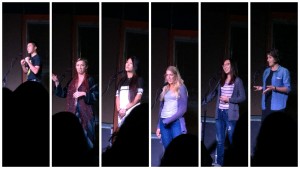The Monti: Live storytelling of life stories at Duke
Last night at the Coffeehouse, six students performed personal stories based on the theme of betrayal. Some stories portrayed how their bodies betrayed themselves; others were about how they betrayed their family; still others depicted times when the storytellers had been betrayed. I was amazed by the diversity of story content and the performers’ courage to share their intimate experiences with a full house.

Jeff Polish, executive director at The Monti, guided the students and helped them work on their narratives. The Monti is a non-profit organization in the Triangle area whose mission is to “create community through the telling of stories.” As the master of ceremonies for the event, Jeff Polish, who sounded like Ray Romano’s voice doppelganger (but not similar to Ray Romano’s signature captious humor), provided enthusiastic introductions for the monologues.
After the event, I tried an exercise of putting myself in the performers’ shoes. Yet, I was stumped trying to think of a personal story about betrayal. There were none that easily came to mind. The more I thought on the matter, I came to the conclusion that in order to be betrayed one must be vulnerable. I often defend against vulnerability, putting up a barrier against disappointments. I also do not like to be blindsided by unexpected events. Or maybe it is that when “betrayed” I refuse to confront that feeling.
However, I learned from the performers that identifying and reconciling with betrayal can allow for growth and forward movement rather than suppressed resentment. The students were introspective enough to identify a point in their life when they were susceptible to betrayal. By formulating a story about it they confronted their feelings of resentment and transformed those emotions into acceptance.
The Monti encourages “ordinary people to tell extraordinary stories.” The Monti hopes that the story itself will resonate with others and foster community. The performers’ stories resonated with me. During the evening, I was able to step back from seeing these students as merely Duke peers. The stories revealed a richness of human experience that went beyond the campus walls. The storytellers were suddenly three-dimensional humans with complex backstories, not merely another Duke student stressed about an upcoming exam. They were extraordinary people telling their extraordinary stories.
-CGM
